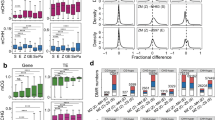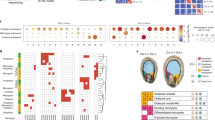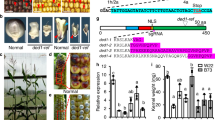Abstract
The maternally expressed Arabidopsis thaliana Polycomb group protein MEDEA (MEA) controls expression of the MADS-box gene PHERES1 (PHE1). Here, we show that PHE1 is mainly paternally expressed but maternally repressed and that this maternal repression of PHE1 breaks down in seeds lacking maternal MEA activity. Because Polycomb group proteins control parental imprinting in mammals as well, the independent recruitment of similar protein machineries for the imprinting of genes is a notable example of convergent evolution.
This is a preview of subscription content, access via your institution
Access options
Subscribe to this journal
Receive 12 print issues and online access
$209.00 per year
only $17.42 per issue
Buy this article
- Purchase on Springer Link
- Instant access to full article PDF
Prices may be subject to local taxes which are calculated during checkout


Similar content being viewed by others
References
Haig, D. & Westoby, M. Am. Nat. 134, 147–155 (1989).
Tilghman, S.M. Cell 96, 185–193 (1999).
Hurst, L.D. & McVean, G.T. Curr. Opin. Genet. Dev. 8, 701–708 (1998).
Grossniklaus, U. et al. Science 280, 446–450 (1998).
Kiyosue, T. et al. Proc. Natl. Acad. Sci. USA 96, 4186–4191 (1999).
Luo, M. et al. Proc. Natl. Acad. Sci. USA 96, 296–301 (2000).
Spielman, M. et al. Trends Genet. 17, 705–711 (2001).
Schubert, D. & Goodrich, J. Curr. Biol. 13, R638–R640 (2003).
Köhler, C. et al. Genes Dev. 17, 1540–1553 (2003).
Lewis, A. et al. Nat. Genet. 36, 1291–1295 (2004).
Vielle-Calzada, J.P. et al. Nature 404, 91–94 (2000).
Vielle-Calzada, J.P. et al. Genes Dev. 13, 2971–2982 (1999).
Wang, J. et al. Nat. Genet. 28, 371–375 (2001).
Silva, J. et al. Dev. Cell 4, 481–495 (2003).
Mager, J. et al. Nat. Genet. 33, 502–507 (2003).
Acknowledgements
We thank L. Hennig for comments on the manuscript. This work was supported by the University of Zürich, the Swiss National Science Foundation (to C.K. and U.G.) and the Epigenome Project of the European Union (to U.G.).
Author information
Authors and Affiliations
Corresponding author
Ethics declarations
Competing interests
The authors declare no competing financial interests.
Supplementary information
Rights and permissions
About this article
Cite this article
Köhler, C., Page, D., Gagliardini, V. et al. The Arabidopsis thaliana MEDEA Polycomb group protein controls expression of PHERES1 by parental imprinting. Nat Genet 37, 28–30 (2005). https://doi.org/10.1038/ng1495
Received:
Accepted:
Published:
Issue Date:
DOI: https://doi.org/10.1038/ng1495
This article is cited by
-
Regulation of plant epigenetic memory in response to cold and heat stress: towards climate resilient agriculture
Functional & Integrative Genomics (2023)
-
DNA Methyltransferase 3 (MET3) is regulated by Polycomb group complex during Arabidopsis endosperm development
Plant Reproduction (2022)
-
Overexpression of Polypogon fugax Type I–Like MADS-Box Gene PfAGL28 Affects Flowering Time and Pod Formation in Transgenic Arabidopsis
Plant Molecular Biology Reporter (2022)
-
LEAFY COTYLEDON1 expression in the endosperm enables embryo maturation in Arabidopsis
Nature Communications (2021)
-
The co-expression of genes involved in seed coat and endosperm development promotes seed abortion in grapevine
Planta (2021)



